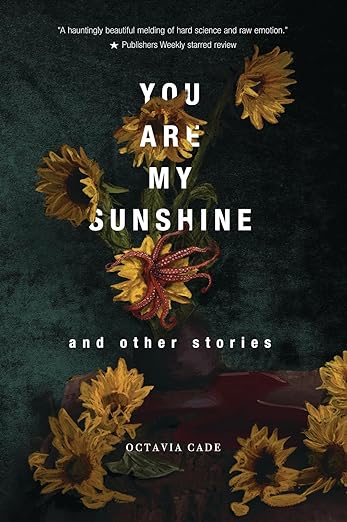You Are My Sunshine
You Are My Sunshine and Other Stories by Octavia Cade. Stelliform Press (2023). RRP: $31.00. PB, 208pp. ISBN: 9781778092640. Reviewed by Alexander Pyles.

The slow-moving horror of extinction and knowledge of what humanity could have done differently pervades Octavia Cade’s debut collection, You Are My Sunshine and Other Stories. The inherent grief embedded in some of the stories, especially the one that shares its name with the collection, carries a weight that can be hard to articulate if the words aren’t inches from your eyes. All of this is to say that Cade remains the most powerful voice in speculative climate fiction. With a careful vision that balances realism with a disconcerting amount of confidence in the human condition, amid all of the loss and mourning that her characters experience, there is also a slim chance of hope.
Some of the stories, especially “We Feed the Bears of Fire and Snow” and “The Body Politic,” slip into a polemical mode that addresses the reader directly. This is effective in doses since it does cause one to question what our culture, especially Western culture, has accepted as commonplace or business as usual. ‘Monsters are too busy lying to think ahead’ (p.10). Others carry on addressing the loss of ecosystems, especially aquatic ones since they are the projected first casualties of the warming oceans.
“You Are My Sunshine” picks up in the world built by her debut novella, The Impossible Resurrection of Grief, detailing fallout as a marine biologist, Cyrus, suffers from failing to save the Pycnopodia helianthoides, the sunflower sea star. He grows sunflowers around his house in self-aware recognition that it is a poor tribute, ‘He didn’t want replacements for sunshine, or for sea stars’ (p.49). A colleague months earlier succumbed to the Grief and he must now deal with his own until severed arms begin arriving in his mailbox. ‘All of the arms were from different people’ (p.35). Over time, this cruel act becomes symbolic of the subject of his research. Yet, after the penultimate moment of the story, Cyrus reaches out to his only friend Jerry seeking connection and help.
It can be taken from Cade’s stories that humanity takes a back seat, as it often does in climate fiction. Humanity is after all the villain in most of these narratives, but there are subtle hints of how communities are built together and how in the face of extreme climate conditions individuals choose to work together, as seen in stories such as “The Streams are Paved with Fish Traps” and “The Stone Wētā.” Discovering ways to outmaneuver the forces that be, such as in the latter story, and reimagining ways to live in harmony with animals that have as much right to our cities as we do in the former, are both exemplary in how they show humanity getting out of its own way.
Despite this, the pervasive Grief cannot be ignored, and more often than not, Cade’s characters are dealing with not only the catastrophic mass extinction of flora and animals, but the struggle against their own losses, as stated by one character in “Pollen and Salt”: ‘We live in a beautiful world, still. You are not in it. You are missed’ (p.111).
The central concern of Cade’s collection comes into focus—Earth deserves to be preserved for its own sake but will go on without us. In the brief moment that humanity exists in the world, we need one another.
Alexander Pyles is a writer, editor, and critic based in the Chicago area (US). His chapbook MILO (01001101 01101001 01101100 01101111) was published by Radix Media as part of their award-winning Futures series. His nonfiction has been published by the Chicago Review of Books, Ancillary Review of Books, Full Stop Magazine, On the Seawall, and Analog Science Fiction & Fact Magazine. He is a member of the National Book Critics Circle.